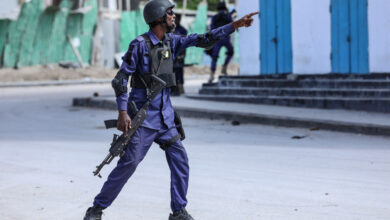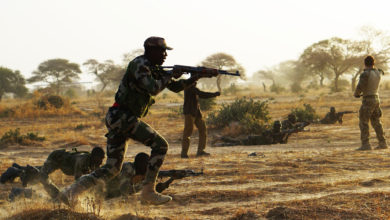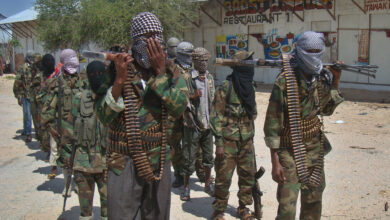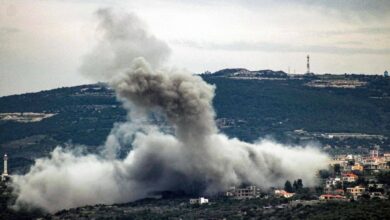Amnesty International has accused U.S. forces of killing several civilians in Somalia as they “dramatically increased” the number of air strikes in the volatile country, but the U.S. military denied the deaths.
U.S. Africa Command said it had carried out 110 strikes by drones and manned aircraft in the past two years in Somalia, killing over 800 people, but insisted every death was that of a “terrorist.”
But Amnesty researchers who investigated five air strikes in detail reported at least 14 civilians had been killed, raising fears the total dead in the scores of attacks may be far higher.
“The attacks appear to have violated international humanitarian law, and some may amount to war crimes,” Amnesty said in a Wednesday, March 20 report, titled “The Hidden U.S. War in Somalia.”
The study is based on 150 interviews including witnesses, family members of those killed and security experts.
Their reports were corroborated by satellite imagery, photographs of the deep craters of the explosions, as well as munition fragments collected from the sites.
U.S. strikes, which included missiles fired by manned aircraft as well as drones, targeted Somalia’s Al-Qaeda linked jihadist insurgent group, Al-Shabaab.
Amnesty said that since April 2017, the U.S. “has dramatically increased the number of air strikes – from manned aircraft and unmanned drones – it has launched in Somalia, tripling the annual rate of attacks.”
It said the number of U.S. air strikes is more than the number of those it carried out in Yemen and Libya combined during the same period.
But Africom insisted they had all been legitimate targets as members of Al-Shabaab, and that the Amnesty report was incorrect.
“Since June 2017, Africom conducted 110 airstrikes in Somalia, eliminating more than 800 terrorists,” it said in a statement, adding that “our assessments found that no Africom airstrike resulted in any civilian casualty or injury.”
Africom added that it was “in the interest of the terrorist group al-Shabaab to untruthfully claim civilian casualties.”
“It is also in the interest of al-Shabaab to coerce community members to make untrue claims,” the command said. “Al-Shabaab and ISIS-Somalia have a history of placing their forces and facilities in and around civilian locations to conceal and shield their activities. Therefore, Africom rigorously assess potential targets to ensure only legitimate al-Shabaab and IS militants are targeted.”
‘Shroud of secrecy’
Amnesty’s military expert Brian Castner said that “the civilian death toll we’ve uncovered in just a handful of strikes suggests the shroud of secrecy surrounding the U.S. role in Somalia’s war is actually a smokescreen for impunity.
“Our findings directly contradict the U.S. military’s mantra of zero civilian casualties in Somalia.”
U.S. strikes in Somalia surged in April 2017, after President Donald Trump declared southern Somalia an “area of active hostilities,” Amnesty said.
It said U.S. forces carried out 34 strikes in 2017 following Trump’s declaration, more than in all the previous five years since 2012 combined.
In 2018, the number of strikes rose to 47 while there have been 24 already in the first two months of 2019 alone.
Most recently, Africom said it was aware of allegations of civilian casualties in a March 18 airstrike near Awdheegle in the Lower Shabelle Region.
“As with any allegation of civilian casualties we receive, U.S. Africa Command will review any information it has about the incident, including any relevant information provided by third parties,” it said in a March 19 strike release.
The previous strike, on March 13, came after Shabaab militants attacked Somali forces with small arms fire while the soldiers were on patrol around Malayle in the Lower Juba Region. No U.S. service members were on the ground and Africom said it assessed no civilians were injured or killed in those strikes.
Al-Shabaab is fighting to overthrow the internationally backed government in Somalia, but has also carried out attacks in neighboring Kenya, which has deployed troops as part of the African Union Mission in Somalia.
Most recently al-Shabaab claimed responsibility for a car bomb outside a restaurant in the capital Mogadishu that killed at least four people and wounded nine more.
On February 4, al-Shabaab targeted the busy Hamarweyne market near the capital’s municipal district. On January 16, the group attacked an upmarket hotel complex in the Kenyan capital Nairobi, killing 21 people during a day-long siege.
The Shabaab were chased out of Mogadishu in 2011 by the 22,000-strong African Union mission AMISOM, and have had to abandon most of their strongholds, but they still control vast rural areas and remain the key threat to peace in Somalia.
The United Nations Security Council reauthorized AMISOM on May 15. It was first launched in 2007 to defend the internationally-backed government against al-Shabaab, and more than 22,000 personnel are deployed on the mission. Africom works with AMISOM on both advise-and-assist missions as well as air support missions to target al-Shabaab’s forces, but has drawn controversy from strikes that have killed civilians.
U.S. forces partner with Somali national security forces in counterterrorism operations, and have conducted frequent raids and drone strikes on al-Shabaab training camps throughout Somalia.
The rising number of strikes has raised concern among aid workers in Somalia, a war-torn country reeling from decades of conflict. Over 1.5 million people are deemed to be struggling in “crisis and emergency” conditions, according to U.N. assessments, while 4.6 million people need food aid.
“More airstrikes and fighting mean more families will flee their homes, and civilian lives will be at risk,” said Evelyn Aero from the Norwegian Refugee Council, which works in Somalia supporting some of the most vulnerable people.
“As a party to the Geneva Conventions of 1949, the US has an obligation to protect civilians,” Aero added.
60 killed in largest US airstrike against al-Shabaab in Somalia since 2017
With reporting from AFP












